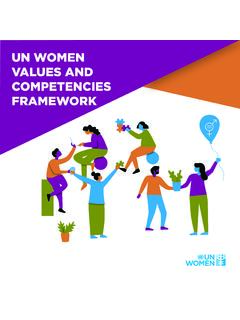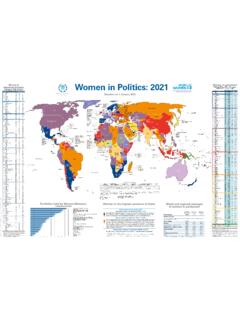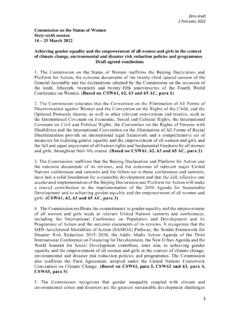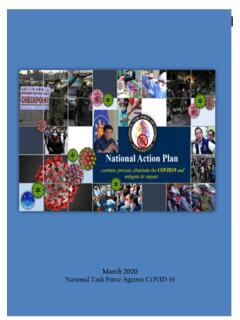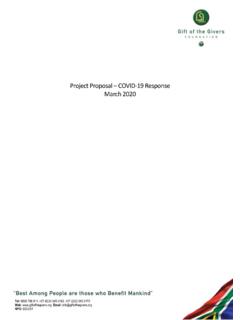Transcription of Concept Note for engagement
1 Orange the World: END VIOLENCE AGAINST WOMEN NOW! United Nations Secretary-General s Campaign UNiTE by 2030 to End Violence against Women 16 Days of Activism against Gender-Based Violence Against Women & Girls 25 November - 10 December 2021 Concept Note for engagement 1. BACKGROUND The 16 Days of Activism against violence against women and girls is an international campaign that takes place each year. It commences on 25 November, the International Day for the Elimination of Violence against Women, until 10 December, Human Rights Day. It was originated by activists at the first Women's Global Leadership Institute in 1991 and this year marks its 30th anniversary. Over 6000 organizations in approximately 187 countries have participated in the Campaign since 1991, with a reach of 300 million1 people.
2 It continues to be coordinated each year by the Center for Women s Global Leadership (CWGL) and is used as an organizing strategy by individuals, institutions and organizations around the world to call for the prevention and elimination of violence against women and girls. In support of this civil society initiative, under the leadership of UN Secretary-General Ant nio Guterres, the United Nations Secretary-General s UNiTE by 2030 to End Violence against Women campaign (UNiTE Campaign), launched in 2008, is a multi-year effort aimed at preventing and eliminating violence against women and girls (VAWG) around the world calling for global action to increase awareness, galvanize advocacy and create opportunities for discussion about challenges and solutions.
3 As in previous years, the colour orange will be used to represent a brighter future, free from violence against women and girls, as a unifying theme running through all the global activities of the UNiTE Campaign. 1 Center for Women s Global Leadership (CWGL) 2 2. 2021 CONTEXT According to the latest estimates, nearly 1 in 3 women aged 15 years and older, around the world have been subjected to physical or sexual violence by an intimate partner, non-partner or both, at least once in their lifetime, indicating that levels of VAWG have remained largely unchanged over the last These numbers do not reflect the impact of the COVID-19 pandemic and would be even higher if they included the full continuum of violence that affect women and girls including sexual harassment, violence in digital contexts, harmful practices and sexual exploitation.
4 COVID-19 has exacerbated all the risk factors for VAWG, including unemployment and poverty, and reinforced many of the root causes such as gender stereotypes and harmful social norms. It has been estimated that 11 million girls may not return to school because of COVID-19, thereby increasing their risk of child The economic fallout is expected to push 47 million more women and girls into extreme poverty in 2021,4 reversing decades of progress and perpetuating structural inequalities that reinforce VAWG. Emerging data from a recent multi-country rapid gender assessment on the impact of COVID-19 on VAW by UN Women, using innovative remote data collection methods, confirm an increase of VAW as a result of COVID-19 in Cameroon, Kenya, Thailand and Ukraine.
5 More data will soon be available for 9 more In addition to the impact of COVID-19, the global context of violent conflicts and humanitarian crises, including climate-related disasters, are affecting more people than ever before, with a disproportionate impact on women and girls, perpetuating all forms of VAWG. As we have seen in the aftermath of the recent earthquake in Haiti, of women have already encountered difficulties in accessing health services while the lack of housing and shelter is perceived by 83% as a factor of insecurity and increased risk of The current complex situation in Afghanistan has led to a disregard for the hard-earned gains in women s While the forms and contexts may differ across geographic locations, women and girls universally experience different forms of violence in public and private settings, in contexts of peace and in contexts of conflict as well as in humanitarian or crises settings.
6 The most marginalized women, including women with disabilities, refugees or indigenous women amongst others, are at disproportionate risk and face greater barriers in accessing services and justice. The COVID-19 pandemic demonstrated that the world was unprepared to respond to the rapid escalation of all forms of VAWG. If we want to ensure that no woman or girl is left behind, we need comprehensive and inclusive approaches that can be adapted to rapidly changing contexts, preventing and responding to all forms of VAWG. 2 World Health Organization, on behalf of the United Nations Inter-Agency Working Group on Violence Against Women Estimation and Data (VAW-IAWGED), Violence Against Women Prevalence Estimates, 2018 (Geneva, 2021).
7 3 United Nations Educational, Scientific and Cultural Organization. Keeping Girls in the Picture (2020); United Nations Population Fund (UNFPA), Impact of the COVID-19 Pandemic on Family Planning and Ending Gender-based Violence, Female Genital Mutilation and Child Marriage: Pandemic threatens achievement of the Transformative Results committed to by UNFPA (2020). 4 UN Women, From Insights to Action: Gender equality in the wake of COVID-19 (New York, 2020). 5 UN Women. Data Bites. Emerging Data on Violence against Women Confirm a Shadow Pandemic. 1 July 2021. 6 UN Women & CARE International (2021) Rapid Gender Analysis: Haiti 14 August 2021 Earthquake 7 3 The EU-UN Spotlight Initiative represents a comprehensive, multistakeholder model driven by a commitment to leave no one behind which is making significant progress in preventing and eliminating violence against women and girls.
8 In 2020 alone, 651,958 women and girls were provided with gender-based violence services despite COVID-19 related constraints and lock-downs, 879,138 men and boys were educated on positive masculinity, respectful relationships and non-violent conflict resolution and parenting, and there was a 22% increase in the number of convictions of perpetrators of violence compared to 2019, showing that it is possible to deliver high-quality results for women and girls even under the constraints of a The Generation Equality Forum (GEF) and the Action Coalition on Gender-Based Violence (GBV) are building a powerful global movement based on multilateralism and are mobilizing governments, CSOs, international organizations, philanthropies and the private sector to deliver transformational progress towards the elimination and prevention of GBV through four concrete actions: (1) Creating enabling policy, legal and resource environments; (2) Scaling up evidence-driven prevention programming; (3) Scaling up comprehensive, accessible and quality services for survivors; and (4) Enabling and empowering autonomous girl-led and women s rights organizations to exercise their expertise.
9 In so doing 550 million more women and girls will live in countries with laws and policies prohibiting all forms of gender-based violence against women and girls by 2026; efforts will increase by 50% the number of countries that include one or more evidence-based prevention strategy on gender-based violence in national policies by 2026; more women and girls will live in countries with multi-sectoral action plans on GBV which include provision of police, justice, health and social sector services by 2026; international funding will progressively improve and increase by 50% to women s rights organizations, activists and movements including those working to address gender-based violence against women and girls in all their diversity by 2026.
10 In this context, our efforts to prevent and eliminate VAWG need to continue with the same vigour during the 16 Days of Activism and throughout the year. Building on the momentum created during the Generation Equality Forum is crucial as the shadow pandemic has not ended and there is no vaccine against it. 3. UNiTE CAMPAIGN S THEME FOR 2021 AND ADVOCACY OBJECTIVES This year s global campaign theme Orange the World: END VIOLENCE AGAINST WOMEN NOW! will mobilize all UNITE networks, civil society and women s rights organizations, the UN system, the Action Coalition on Gender-Based Violence, government partners, schools, universities, private sector, sports clubs and associations and individuals to: Advocate for inclusive, comprehensive and long-term strategies, programmes and resources to prevent and eliminate VAWG in public and private spaces prioritizing the most marginalized women and girls.

